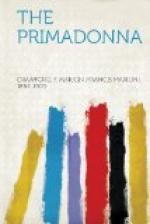Schreiermeyer’s business ear had caught the figures. As they walked, each with an arm through one of the Primadonna’s, he leaned back and spoke to Stromboli behind her head.
‘How the devil do you know what the house was?’ he asked sharply.
‘I always know,’ answered the Italian in a perfectly matter-of-fact tone. ’My dresser finds out from the box-office. I never take the C sharp if there are less than three thousand.’
‘I’ll stop that!’ growled Schreiermeyer.
‘As you please!’ Stromboli shrugged his massive shoulders. ’C sharp is not in the engagement!’
‘It shall be in the next! I won’t sign without it!’
‘I won’t sign at all!’ retorted the tenor with a sneer of superiority. ’You need not talk of conditions, for I shall not come to America again!’
‘Oh, do stop quarrelling!’ laughed Cordova as they reached the door of her box, for she had heard similar amenities exchanged twenty times already, and she knew that they meant nothing at all on either side.
‘Have you any beer?’ inquired Stromboli of the Primadonna, as if nothing had happened.
‘Bring some beer, Bob!’ Schreiermeyer called out over his shoulder to some one in the distance.
‘Yes, sir,’ answered a rough voice, far off, and with a foreign accent.
The three entered the Primadonna’s dressing-room together. It was a hideous place, as all dressing-rooms are which are never used two days in succession by the same actress or singer; very different from the pretty cells in the beehive of the Comedie Francaise where each pensioner or shareholder is lodged like a queen bee by herself, for years at a time.
The walls of Cordova’s dressing-room were more or less white-washed where the plaster had not been damaged. There was a dingy full-length mirror, a shabby toilet-table; there were a few crazy chairs, the wretched furniture which is generally to be found in actresses’ dressing-rooms, notwithstanding the marvellous descriptions invented by romancers. But there was light in abundance and to excess, dazzling, unshaded, intolerable to any but theatrical eyes. There were at least twenty strong electric lamps in the miserable place, which illuminated the coarsely painted faces of the Primadonna and the tenor with alarming distinctness, and gleamed on Schreiermeyer’s smooth fair hair and beard, and impassive features.
‘You’ll have two columns and a portrait in every paper to-morrow,’ he observed thoughtfully. ’It’s worth while to engage such people. Oh yes, damn it, I tell you it’s worth while!’
The last emphatic sentence was intended for Stromboli, as if he had contradicted the statement, or were himself not ‘worth while.’
‘There’s beer there already,’ said the tenor, seeing a bottle and glass on a deal table, and making for them at once.
He undid the patent fastening, stood upright with his sturdy stockinged legs wide apart, threw his head back, opened his huge painted mouth to the necessary extent, but not to the full, and without touching his lips poured the beer into the chasm in a gurgling stream, which he swallowed without the least apparent difficulty. When he had taken down half the contents of the small bottle he desisted and poured the rest into the glass, apparently for Cordova’s benefit.




